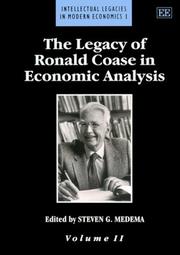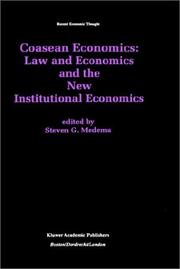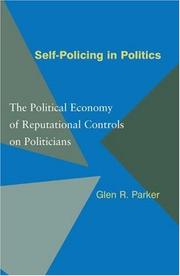| Listing 1 - 5 of 5 |
Sort by
|
Book
ISBN: 0333556453 Year: 1994 Publisher: Basingstoke Macmillan
Abstract | Keywords | Export | Availability | Bookmark
 Loading...
Loading...Choose an application
- Reference Manager
- EndNote
- RefWorks (Direct export to RefWorks)
Economics --- Economists --- 08 --- 330.08 --- AA / International- internationaal --- History --- Biography --- Biografieën en memoires --- Economisten --- Coase, R. H. --- Coase, Ronald Harry --- Coase, Ronald H.

ISBN: 1858980100 9781858980102 Year: 1995 Volume: 1 Publisher: Aldershot Elgar
Abstract | Keywords | Export | Availability | Bookmark
 Loading...
Loading...Choose an application
- Reference Manager
- EndNote
- RefWorks (Direct export to RefWorks)
Economics --- History --- Coase, Ronald H. --- Coase, R. H. --- Coase, Ronald Harry --- -Economische analyse en research. Theorie van de informatie. --- 305.6 --- 330.2 --- 330.48 --- 338.00 --- 338.40 --- 347.23 --- AA / International- internationaal --- 330.1 --- 338 <09> --- 338 <09> Economische geschiedenis --- Economische geschiedenis --- 330.1 Economische grondbegrippen. Algemene begrippen in de economie --- Economische grondbegrippen. Algemene begrippen in de economie --- Risicotheorie, speltheorie. Risicokapitaal. Beslissingsmodellen --- Economische analyse en research. Theorie van de informatie --- Neo-klassiekers en andere post-keynesiaanse theorieën. Public choice. Institutionalisten. Home economics. Analyseschool van de transactiekosten --- Theorie van de productie --- Industrieel beleid: algemeenheden --- Eigendom (recht) --- Economic analysis of law --- Economische analyse en research. Theorie van de informatie. --- Economie politique --- Histoire --- Economics - Great Britain - History - 20th century

ISBN: 0792380347 9401062498 9401153507 Year: 1998 Volume: 60 Publisher: Boston : Kluwer Academic Publishers,
Abstract | Keywords | Export | Availability | Bookmark
 Loading...
Loading...Choose an application
- Reference Manager
- EndNote
- RefWorks (Direct export to RefWorks)
Upon hearing that Ronald Coase had been awarded the Nobel Prize, a fellow economist's first response was to ask with whom Coase had shared the Prize. Whether this response was idiosyncratic or not, I do not know; I expect not. Part of this type of reaction can no doubt be explained by the fact that Coase has often been characterized as an economist who wrote only two significant or influential papers: "The Nature of the Firm" (1937) and "The Problem of Social Cost" (1960). And by typical professional standards of "significant" and "influential" (i. e. , widely read and cited), this perception embodies a great deal of truth, even subsequent to Coase's receipt of the Prize. This is not to say that there have not been other important works - "The Marginal Cost Controversy" (1946) and "The Lighthouse in Economics" (1974) come immediately to mind here - only that in a random sample of, say, one hundred economists, one would likely find few who could list a Coase bibliography beyond the two classic pieces noted above, in spite of Coase's significant publication record. ' The purpose of this collection is to assess the development of, tensions within, and prospects for Coasean Economics - those aspects of economic analysis that have evolved out of Coase's path-breaking work. Two major strands of research can be identified here: law and economics and the New Institutional Economics.
Externalities (Economics). --- Institutional economics. --- Law --- Right of property. --- Economic aspects. --- Coase, Ronald H. --- Economies externes --- Institutionnalisme --- Coase, R. H. --- Economic analysis of law --- Law of real property --- Externalities (Economics) --- Droit de propriété --- Droit --- Aspect économique --- Law and economics. --- Economic history. --- Public finance. --- Microeconomics. --- Law and Economics. --- History of Economic Thought/Methodology. --- Public Economics. --- Price theory --- Economics --- Cameralistics --- Public finance --- Public finances --- Currency question --- Economic conditions --- History, Economic --- Economics and jurisprudence --- Economics and law --- Jurisprudence and economics --- Jurisprudence --- Ownership of property --- Private ownership of property, Right of --- Private property, Right of --- Property, Right of --- Property rights --- Right of private ownership of property --- Right of private property --- Right of property --- Right to property --- Civil rights --- Property --- Costs, Social --- External economies and diseconomies --- External effects (Economics) --- Social costs --- Public goods --- Waste (Economics) --- Welfare economics --- Law and legislation
Book
ISBN: 9780857937919 Year: 2013 Publisher: Cheltenham Elgar
Abstract | Keywords | Export | Availability | Bookmark
 Loading...
Loading...Choose an application
- Reference Manager
- EndNote
- RefWorks (Direct export to RefWorks)
Law and economics --- Law --- Sociological jurisprudence --- 08 --- 330.48 --- 380.20 --- 380.4 --- AA / International- internationaal --- Law and society --- Society and law --- Sociology of law --- Jurisprudence --- Sociology --- Law and the social sciences --- Acts, Legislative --- Enactments, Legislative --- Laws (Statutes) --- Legislative acts --- Legislative enactments --- Legislation --- Economics and jurisprudence --- Economics and law --- Jurisprudence and economics --- Economics --- Philoosphy --- Biografieën en memoires --- Neo-klassiekers en andere post-keynesiaanse theorieën. Public choice. Institutionalisten. Home economics. Analyseschool van de transactiekosten --- Prijstheorieën: algemeenheden --- Theorie van het ruilverkeer --- Coase, R. H. --- Coase, Ronald Harry --- Economic analysis of law --- Coase, Ronald H. --- Biografieën en memoires --- Neo-klassiekers en andere post-keynesiaanse theorieën. Public choice. Institutionalisten. Home economics. Analyseschool van de transactiekosten --- Prijstheorieën: algemeenheden

ISBN: 069111739X Year: 2004 Publisher: Princeton, NJ : Princeton Univ. Press,
Abstract | Keywords | Export | Availability | Bookmark
 Loading...
Loading...Choose an application
- Reference Manager
- EndNote
- RefWorks (Direct export to RefWorks)
Contrary to what news reports might suggest, the majority of politicians behave ethically and are never subject to investigations. Is this because of the elaborate system of rules Congress has constructed to regulate the conduct of its members as well as the fear of electoral reprisal? Drawing on economic literature on the behavior of firms, Glenn Parker answers no. He argues that members of Congress behave ethnically not because of the fear of punishment but because of their concern for their reputations. He draws parallels between politicians and businesses, since both stand to suffer significantly when accused of wrongdoing. Just as business' poor behavior can cause brand names to be tarnished, prices to plummet, and future business to disappear, dishonest politicians stand to sacrifice the human capital invested in their careers, and premiums for honesty, such as electoral security and prestigious post-elective employment. Parker explores public attitudes toward the behavior of members of Congress and shows how those attitudes shape the way members conduct their professional lives. Written from the perspective of public choice, this book offers a novel approach to the question of how to keep politicians honest.
Self-control --- Political ethics --- Political corruption --- Legislators --- Economic aspects. --- United States. --- Agrawal, Anup. --- Akerlof, George H. --- Beard, Edmund. --- Bianco, William T. --- Cain, Bruce. --- Coase, Ronald H. --- Davis, Michael. --- Downs, Anthony. --- Ferejohn, John. --- Fiorina, Morris. --- Goff, Brian. --- Horn, Stephen. --- Ippolito, Pauline M. --- Klein, Benjamin. --- Krehbiel, Keith. --- Maloney, Michael. --- Ornstein, Norman J. --- Peltzman, Sam. --- Saloma, John S. --- Teeters, Holly. --- Van Houweling, Robert. --- Vanbeek, James R. --- Ward, Daniel S. --- Welch, Susan. --- Yiannakis, Diana Evans. --- adverse selection. --- assumptions: extended dealings. --- congressional casework. --- congressional foreign travel. --- corruption. --- elections: control of politicians. --- extended dealings. --- faithful-agent reputation: coding. --- home style. --- honoraria. --- hypotheses. --- incomplete contracts. --- last-period problems: in Congress. --- legislator-constituent contact. --- moral hazards. --- opportunism: check kiting. --- post-elective employment: categories of. --- price premium. --- principal-agent relationship. --- quasi-experimental research. --- quasi-rents. --- rational ignorance. --- reputation: accessibility. --- reputational control: evidence of. --- residual claimant. --- shirking: in Congress. --- vertical integration.
| Listing 1 - 5 of 5 |
Sort by
|

 Search
Search Feedback
Feedback About
About Help
Help News
News